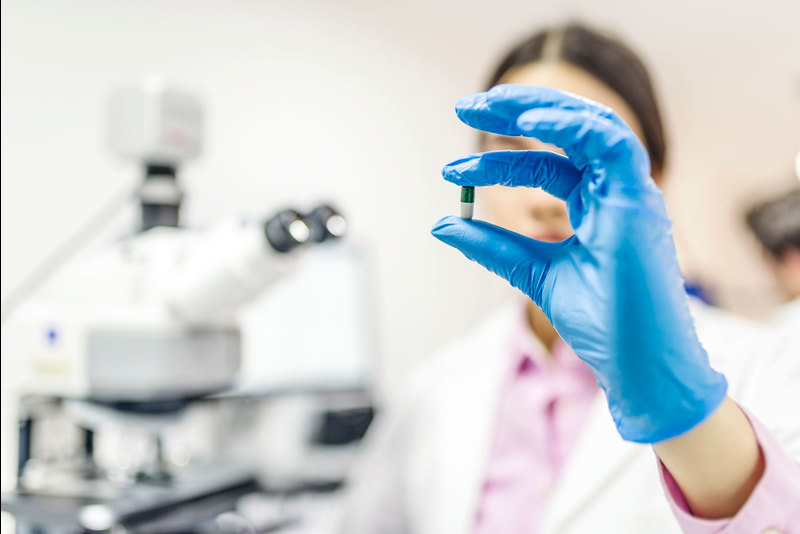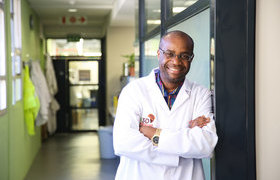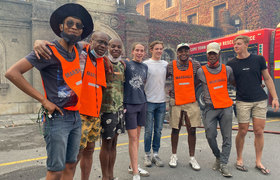New partnership with UCT-based H3D Foundation to strengthen African drug research
01 October 2021 | Story Wendyl Martin. Photo Getty Images. Read time 6 min.
A new partnership formed by the H3D Foundation (the H3D-F) at the University of Cape Town (UCT) and a global pharmaceutical body is set to ensure and accelerate medicinal drug research and discovery in Africa.
On 28 September 2021 the UCT Drug Discovery and Development Centre (H3D), through its foundation, the H3D-F and the International Federation of Pharmaceutical Manufacturers and Associations (IFPMA), launched a partnership that aims to bolster African drug research ahead of potential pandemics.
Belinda Bhoodoo of the IFPMA’s Africa Engagement Committee told an online launch gathering that it would be a three-year partnership.
The gathering was attended by representatives of pharmaceutical companies, the IFPMA, health bodies, donor foundations, media and the government.
“These two organisations are coming together within the IFPMA’s context or objective of building an innovation culture on the continent … We are announcing a three-year partnership aimed at strengthening capacity for health innovation on the continent,” said Bhoodoo.
“We will combine forces to focus on driving capacity strengthening for drug discovery and development in Africa.”
“We will combine forces to focus on driving capacity strengthening for drug discovery and development in Africa, by scaling existing initiatives and identifying new opportunities for younger and mid-career scientists in the region.”
She explained that the partnership was the brainchild of Professor Kelly Chibale – the founder and director of H3D and the chairman and chief executive officer of the H3D Foundation, as well as a professor of organic chemistry at UCT – and the IFPMA’s director of innovation policy, Guilherme Cintra.
Bhoodoo said the IFPMA represents research-based biopharmaceutical companies, as well as regional and global pharmaceutical manufacturer associations.
“We engage with health and research players to facilitate the co-creation of sustainable policies and initiatives that encourage the discovery of and access to medicines and vaccines to patients globally,” she said.
In a statement released at the launch, Professor Chibale – who holds the Neville Isdell Chair in African-centric Drug Discovery and Development – said the H3D is the only integrated drug discovery and development platform in Africa; and that over the last 10 years, it has proven itself as a facility to develop infrastructure, talent, and health innovation to improve lives in Africa and across the world.
Chibale’s vision
To the online gathering, he described the beginnings of his journey with the H3D and the H3D Foundation as fulfilling a vision.
“God gave me a vision which I saw. It is a vision to meet unmet medical needs in Africa, coupled with using science for development to specifically create jobs and create an absorptive capacity that will allow us to keep talent in the African continent. It is to identify that talent, to attract it, to develop it, to nurture it and retain it,” said Chibale.
“Secondly, when I saw this vision, I saw it very clearly. I then recognised and knew that I didn’t know about how to discover drugs. It is about seeking help from partners, of which the first one was [the] Medicines for Malaria Venture (MMV), along with the South African government, to provide the three ingredients: infrastructure, technologies and talent. The rest is history.”
Partnership is key
In further explaining the IFPMA’s support for the partnership, Bhoodoo said their organisation will be an anchor partner to provide short- to mid-term support in increasing awareness around the H3D-F’s activities, and to develop and strengthen the capacity of human resources for health innovation in Africa.
“[The IFPMA) will facilitate networking and visibility across the innovation ecosystem through [its) membership and offer opportunities for collaboration from drug development to market.”
“Together, this partnership aims to call attention to drug innovation and access in the region – both of these are key pillars to achieving the Sustainable Development Goals and universal health coverage,” she added.
“Together, this partnership aims to call attention to drug innovation and access in the region.”
Partnership was a key element for success identified by all at the gathering. Chibale listed support from the South African government and support from UCT as part of the success of H3D and the H3D Foundation.
“This network-of-partnerships model can be seen in the partnership between academia, such as the University of Cape Town, and pharmaceutical companies – for [a] product development partnership, like MMV – and government.
“This model, importantly, is recognising what each partner can do in their home institution, based on what they have. What they don’t have [is] then filled and addressed by the partners. It is not just capacity building for the sake of it; it is a model that is about prosecuting projects, getting the job done, and then building capacity. It is capacity building where it’s led by a project that scales, through sustained, world-class excellence,” said Chibale.
Gaps are part of the journey
However, as on any journey the retrospective view affords an opportunity to identify gaps; and Chibale identified skills shortages and infrastructure as the major stumbling blocks in the way of African drug discovery.
“If there is one really critical ingredient, it is a critical mass of skilled talent. For drug discovery, this is a team-based, inter-disciplinary science, integrating early-stage drug discovery, chemistry, biology and pre-clinical pharmacology. So, it’s having scientists skilled in these areas, and of course other areas that are critical to support the enterprise.
“[There is also the issue of] infrastructure: can you even order chemicals? This is not trivial; this is about the procurement of reagents. We saw this during COVID – you cannot even donate items across borders easily in Africa. We have to remove those barriers,” he said.
In his launch statement, Greg Perry (the assistant director general of IFPMA) said global product development research driven by local needs is pivotal to achieving shared global goals.
“With H3D-F, now is the time to forge long-term relationships that lay the foundation for scientific coordination, communication, and discovery in Africa. IFPMA is proud to support H3D-F’s efforts,” said Perry.
Bhoodoo added: ““Drug innovation does not exist in a vacuum. [Partnership will help to] make sure that drug discovery on the continent is going to be in place – and hopefully, before the next pandemic hits.”
 This work is licensed under a Creative Commons Attribution-NoDerivatives 4.0 International License.
This work is licensed under a Creative Commons Attribution-NoDerivatives 4.0 International License.
Please view the republishing articles page for more information.










